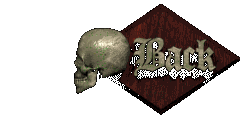
'Wreaking Overrun'
(Self released CDr, recently reissued by Magik Art
Entertainment)
MARK: 85/100
If
you prefer old school elite Black metal, then you probably already know
this Moscowian band at its third CD; if not, you must absolutely listen
to it and you'll find out some clear influences from the '80s but also
several personal elements that will give you a quite positive impression
about the 2-piece, here helped by session member Messiah A.M.
The CD is divided in two parts, "The Peak of Hate"
and "On the Foundation of Past" and includes lyrics
dealing with hatred towards humanity, mysticism and nature glorification.
After "Intro", first disquieting and frozen, later
pompous, and in the end caught up with a propaedeutical guitar, "Cities
Must Fall" starts and it's hell on earth! This track runs fast
and rabid with Bathorian vocal patterns till a groundbreaking slowdown
interrupts the song with a great riff; the final acceleration goes repeating
the refrain and the first strophe with an abrupt stop; it's a vicious
attack against technological progress that doesn't respect nature and
forgets that man is not the sole being on this agonizing planet.
A demolishing mid-tempo opens "The Black Trace", anticipating
another annihilating drum blast; this composition reminds me of the
very early Behemoth as for vocals and riffs whereas the middle riff
is plainly Falkenbach-influenced. Killer!
As the very title suggests, "Hate" displays a tight
and razor-edged tissue on which different kinds of the most evil vocals
are added; there are a few male vocals added to Stellarghost's roughest
lead female ones.
Only "Mistake" is a bit inferior to the rest; a head
down and scorn-ridden incursion concluding the first part of the CD;
it adds nothing new but is still pleasant after all.
The 2nd part begins with "The Silent Knowledge", strongly
diverse from the previous songs; it deals with the Mayhem of "De
Mysteriis Dom Sathanas" and Ondskapt; I adore the angry and
the ghostly male vocals, and how they've been interlaced with the guitar
plot, partly semi-acoustic until the melancholic ending. It truly gives
the idea of restoration on the past ruins. Further numbers of high school
are represented by the central back up vocals and the almost Folk arpeggio.
This remains the highlight of the CD to me even after a year I listened
to the self-recorded version.
On the same trail nevertheless more distorted is "Young and
Cursed", composed by D. Gans (R.I.P.) in 1991 and supremely
re-arranged by the Russian act. Another of the better built tracks with
Progressive keyboards, an excellent, fanciful drumwork and unforeseeable
rifferama. Manhater's voice here faithfully kindles the idea of him
nailing you to the wall shaking you and screaming at 5 centimetres from
your face with the maximum possible rage.
"Baba-Yaga" was originally written by Musorgsky in
1874 and almost 150 years later, Twilight Is Mine homage their connational
with an alliance between Metal and Classical music, piano and keyboards;
Musorgsky's version was already modern and effectively
dim, but the 3-piece makes it a nowadays destabilizing masterpiece.
I've always preferred Musorgsky and Prokofiev to the more gleeful Tchaikowsky
("The Lake of the Swans" for example) and this version
can't but confirm my feeling.
Pronto comes the "Outro", deign end to this CD, reprising
the aria suspended after the prologue
Finally, let me just add that the sounds on this CD are good and the
ones of the drums practically perfect for a Black metal record and that
the Cd was recorded during the spring and autumn of 2003, but the material
was composed between 1999 and 2000 except for the two above-mentioned
tracks.
I'll shut up, you'll shut up. Let the Twilight speak its truth...
MARKUS GANZHERRLICH - 12/2/06
E-mail: stellarghost@nm.ru
http://twilightismine.narod.ru/Frameseteng.htm
Discography:
-When the Twilight Covers the World (CD, 2001 - re-released in 2005)
-The Egregor of Evil (CD, 2002)
-Wreaking Overrun (CD, 2003 - re-released in 2005)
-...vom Nachtnebel umarmte Wälder (4-way split - 2006)
-Evolution of Degradation (CDr - 2008)

